Happy Earth Day!
I am celebrating today by not eating meat and recuperating from a busy week of educational speaking events. Last week, Johnson & Wales University invited me and Elle Palmer to speak at their Art & Sciences events about sustainability and the environment. Our talk was entitled “The Very Inconvenient Truth,” where we shared information about why meat and dairy consumption is the number one polluter of the environment.
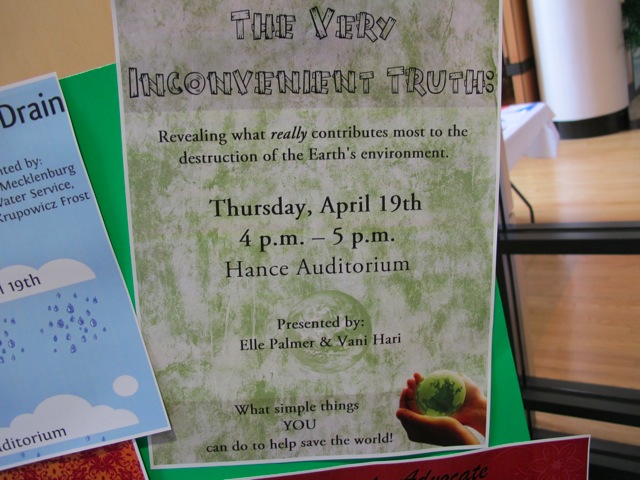
Before the event, we passed out coconut based ice cream sandwiches that Earth Fare was generous to donate. We wanted the students to realize that it’s possible to reduce dairy consumption – even with ice cream! And of course we wanted the students jacked up on sugar ready to listen to what we had to say!
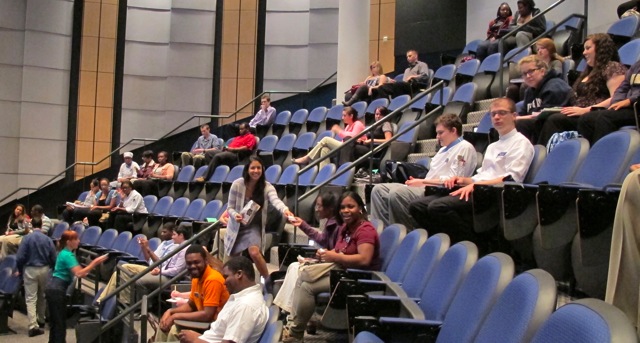
I kicked off the talk by sharing some of the environmentally friendly activities I practice – Walking to work, sharing one car with my husband, always recycling, carrying my own shopping bags to the grocery store, buying organic and/or local as much as possible, reducing the amount of harmful chemicals in my cleaning or cosmetic products, supporting the Environmental Defense Fund….etc. But none of these habits have a bigger impact on the environment than the way I eat. As you might know, I am not vegan, not vegetarian, and not pescatarian either. I don’t eat beef (because of religious and personal preference). But when I do eat meat – it’s usually local, organic and I know its source and I limit my consumption dramatically compared to the typical American who eats 270 pounds of meat a year. I have about 4 ounces or so a week, sometimes every two weeks, making my average around 10 pounds a year. See! That’s a dramatic difference.
Here are some of the facts I shared with the students, if you eat less meat & dairy products you can:
- Feed more people – We have one billion people on earth already that don’t have enough to eat and a projected 3 billion more mouths to feed within 50 years. The fact that you can feed 2000 people the same amount of grain it takes to feed only 100 cows should help people wake up, but it hasn’t.
- Reduce pollution dramatically – The meat and dairy industry contributes 18% more climate changing pollutants than all modes of transportation combined.
- Save water – It takes 60 pounds of water to produce one pound potatoes, but it takes 9000 liters to produce one pound of beef. A vegan can keep their shower running all year long and still not surpass the amount of water a meat eater consumes.
- Improve your health – Overconsumption of meat has been proven to cause heart disease, cancer, and diabetes more than any other food we eat. If you don’t believe me – read The China Study. Also, you can dramatically reduce your exposure to cancer causing dioxins which are found in chemical pesticides that are used to grow animal feed.
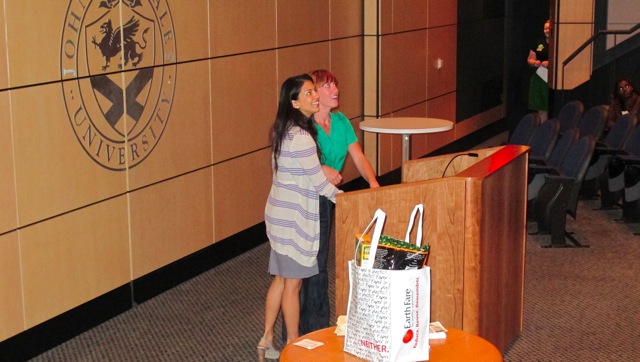
Elle later shared her personal journey to becoming vegan and how she created 3 Weeks to Wellness. At the end of the event, we showed a movie entitled “Life Connected” available on You Tube.
Earth Fare sponsored a giant bag of vegan organic food for one lucky student to win in a raffle. We drew the winner after that talk and Andrew Skelton won. BTW – Earth Fare has one of the best coupons ever right now – 20% of bulk. You can get these by signing up for their email newsletter.
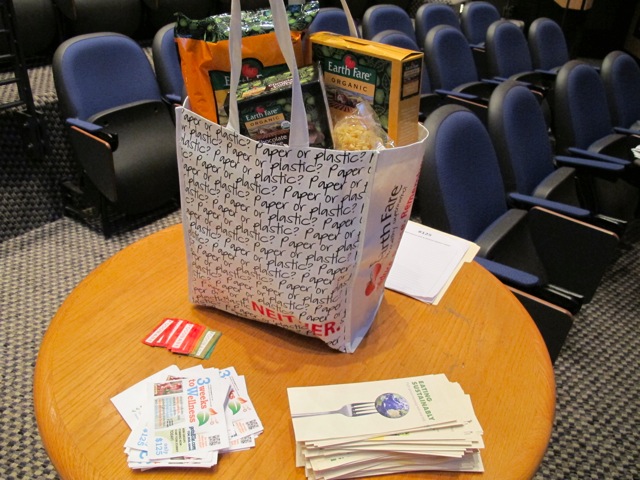
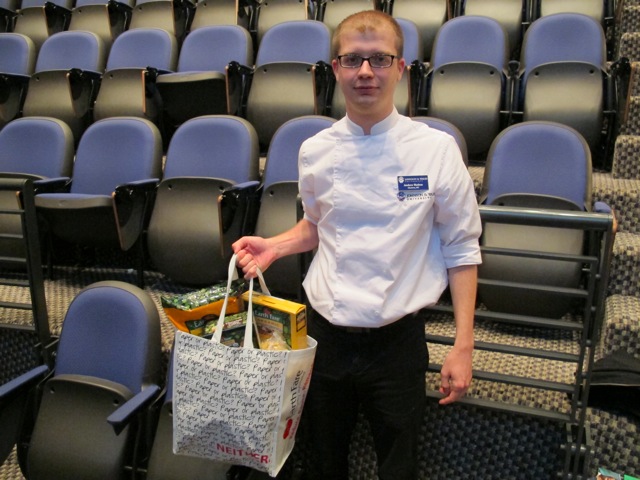
Before leaving, students swarmed us with more questions about eating right and where they can learn more. Professor Howard Slutzky surprised us with parting gifts for our time and commitment on our way out… a very thoughtful and appreciated gesture.

I can’t wait to be a part of more future events like this – I only wish someone taught me about real food, nutrition and what consumption of meat & dairy was doing to me and the environment when I was in college!
Hope you are having very green filled Earth Day! How are you celebrating?
Food Babe



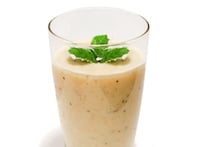
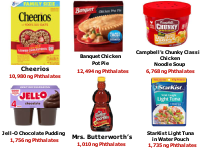
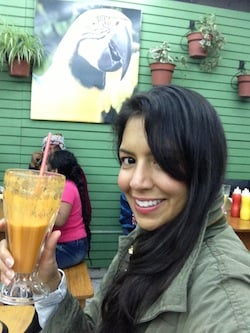


Great article and information! I look forward to sharing this, especially with Meatless Monday coming up!
Thanks Jereka… I appreciate your following and support always!
In your list of facts you say it takes 60 pounds of water to produce 1 pound of potatoes but 9000 liters to produce 1 pound of beef. That’s confusing to me to use pounds of water in your potato example but liters in your meat example. It may just be me because I’m not great at math but to get a better picture of what you’re saying how many pounds of water does it take to produce 1 pound of beef? Thanks so much! Love your site!
Haha… so theres 2.2 pounds in every liter, so it’s 9000 x 2.2, whatever that is 🙂 I don’t like math either! But I hope you get the point – it’s a lot!
Looks like a wonderful presentation Vani! I love your balanced view on food and your practice of enjoying meat in small amounts. I find there is a lot of information out there that preaches all or nothing attitudes. There are personal trainers who boast about animal proteins at every meal, and many who abolish animal proteins completely and then slowly add some back in for lack of vitamins. I think your approach makes a lot of sense and is very similar to the lifestyle I like to enjoy! Thank you for this!
Gillian – I think that’s why I love you and your blog too!
So 19,800 pounds! Thank you Food Babe! It makes it a lot easier to understand now.
I love that you want to share your eating habits with others, there is so much people can learn from you! I have to disagree over meat though. Your water use figure is probably for grain-fed feedlot beef. That is about the worst way to produce beef, for the environment, for the welfare of the animals and for the nutritional value. Pasture fed beef requires very little water though. Our cattle drink from our rainwater dams, we don’t pump from rivers or streams, we catch rainwater, to me that water consumption is irrelevant. The only drinking water use would be in processing the meat. I think that we have to distinguish between different meat production methods rather than generalising. If you eat organic pasture-fed meat, it is certainly not as bad for the environment as factory meat. In fact, an organic farm has to have an organic management plan that describes how it will improve soil fertility and work within natural cycles, by its very nature, organic farming should have minimal environmental impact, whether it is meat or vegetable farming. Anyway, love your blog, just wanted to add the farmer’s perspective! Cheers, Liz
Liz you make such an excellent point and I’m so glad you did! Organic farming is extremely better for the environment, uses less water and I think is the key to feeding the world…I seriously wish I could get meat and dairy products from your farm – Maybe one day!
It’s hard not to generalize considering 99% of all meat in the US comes from factory farming and the industry is just increasing in size. 🙁 http://www.farmforward.com/farming-forward/factory-farming
I completely understand that every farmer is entitled to their own opinion and as a farmer I appreciate your views on how to raise cattle, but your response isn’t speaking for all or even the majority of cattle farmers.
It is very concerning that you both refer to modern animal agriculture as “factory farming”. As I am personally involved in all facets of the beef community, a cow calf producer by trade and a feedlot intern after college, it is very concerning and quite offensive to this community when you refer to us as factory farmers, just FYI. I am not opposed to other types of beef and in fact promote all types of beef for my job (grain and grass fed, natural and organic), but regardless of your beef preference, you are incorrectly speaking for millions of farmers nation wide that get up every morning and give their animals the same standard of care that you would give yours at your grass-fed operation, just in a different way.
Being on a feedlot for the last six months, riding pens every morning for several hours a day, has opened my eyes at the standards of care given to our cattle produced for beef. We have a death loss of only 0.5% every year on 10,000 head of cattle, that is incredibly low, and credit can be attributed to the talented cowboys that care for these cattle every single day. There are no days off at the feed yard (even on football days) we are still at the yard every morning at 6:30 and checking cattle at daylight. Cattle are treated immediately for sickness and whether you approve of the judicious use of antibiotics or not, it is completely necessary for our standard of care, which is incredibly high.
We are responsible for producing and guaranteeing a safe and wholesome product at the feedlot, and that is exactly what we do. We produce a product that is delicious and nutritious as well. Did you know that beef provides the same amount of protein with less calories as seven tablespoons of peanut butter? A serving size of beef is 3 oz and is a naturally nutrient rich dense source of protein.
I appreciate all types of farmers and beef producers, but when you are trying to feed the world shouldn’t we consider all types of outlets? Traditional and non?
Also, if we only use pasture fed beef all that grain that is wasted in feedlots can be used to feed people. I think the method is wrong not the meat! If you believe Joel Salatin, we can produce all beef off pasture if we use the right methods.
(But I don’t know anything about the health effects, we eat a freezer full of our own beef a year, so that would be on the high side of consumption, will read that article to find out more).
Totally agree that we can feed the world with the grain used on factory feedlots. Can’t wait for you to read The China Study… let me know what you think. It’s a game changing book…
What is the most powerful thing we can do to help the environment? After alot of careful consideration it becomes clear that we need serious help.
if my people, who are called by my name, will humble themselves and pray and seek my face and turn from their wicked ways, then I will hear from heaven, and I will forgive their sin and will heal their land. 2 Chronicles 7:14.
Hi! I was first introduced to your blog from Lisa over at 100 days of real food. I am have been slowly trying to switch our small family (hubs and me) over to real food. This past weekend we took a big step and visited a locally family owned %100 organic grass fed farm. It was a wonderful experience and can’t wait to eat our chicken that is %100 antibiotic free. Anyways I would like to start incorporating vegetarian dishes to our meal but the hubby is super picky. Is there a vegetarian cookbook you recommend that meets real food standards, has delicious meals, and doesn’t have super complicated reciepes. Thanks for all you do!!
Check these out. http://amzn.to/Ihi3Xw
http://amzn.to/ImLd6B
Also – have you tried my recipes? Super easy and delicious!
Great article, thanks for sharing. So happy to find your website! We have severely cut back our meat intake (my husband was a meat & potatoes guy) and even he hasn’t found it challenging.
Same here! My husband has reduced his meat in take dramatically in the last few years and doesn’t miss it a bit.
I’m pledging to carpool to work, take shorter showers and use less plastic wrap. Just found your website and I’ll be here daily. Thanks a bunch. Love it 🙂
Approaching Earth Day next month, it would be really interesting to read your take on the most recent ISAAA report regarding the impact of GM crops on the environment or on organizations like the ISAAA and how much credibility they have.
Hi – Enjoying your articles and recently heard about a vegan alternative called Beyond Meat, it is processed but non-GMO? Any thoughts on this product? Thank you